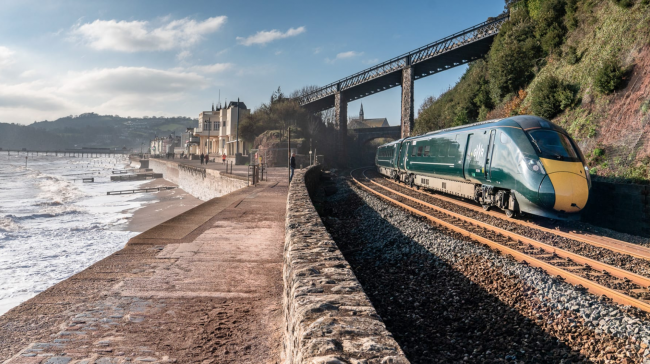3 minute read
Hitachi and Eversholt Rail to develop intercity battery hybrid train
Hitachi Rail and Eversholt Rail have signed an agreement aimed at bringing battery power – and fuel savings of more than 20% – to the Great Western Railway (GWR) intercity express trains that operate between Penzance and London.
The 36 trains that run on the line were introduced by rail operator GWR in August 2018. Now, the partnership between Hitachi, the train builder and maintainer, and Eversholt Rail, the train owner, will develop a plan to install batteries on an existing five-carriage intercity express train. The trial will demonstrate that the innovation meets passenger service and safety standards.
The line between the South West and London is only partially electrified, with the majority of the 300 mile journey requiring diesel power. The partnership is looking at batteries replacing a diesel engine as a power source on the Hitachi-built trains – currently known as a bi-mode for its ability to switch seamlessly between electric and diesel power.

Hitachi and Eversholt Rail are to develop a GWR intercity battery hybrid train, replacing diesel engines and reducing fuel usage and carbon emissions / Picture: Hitachi Rail
Adding a battery creates an electric-diesel-battery hybrid train (tri-mode). On non-electrified sections of the route, the batteries will supplement the power of the engines to reduce fuel usage and carbon emissions by more than 20%. Whereas when travelling in and out of stations and surrounding urban areas, the train would rely on battery power only. This has the benefit of improving air quality and dramatically reducing noise levels.
GWR’s intercity express train fleet currently calls at 15 non-electrified stations on its journey between Penzance and London, all of which could benefit from trains running on battery-only power.
Hitachi Rail will draw upon market-leading expertise in Japan, and the support of its battery partner – Hyperdrive Innovation. The two North East-based companies reached an agreement in July 2020 to create and develop battery packs for mass production at Hyperdrive’s HYVE facility in Sunderland, the UK’s first independent battery pack manufacturing facility.
The projected improvements in battery technology – particularly in power output and charge – create opportunities to replace incrementally more diesel engines on long distance trains. With the ambition to create a fully electric-battery intercity train that can travel the full journey between London and Penzance by the late 2040s, in line with the UK’s 2050 net zero emissions target.
Jim Brewin, UK & Ireland country lead at Hitachi Rail, added: “This partnership is an exciting opportunity to unlock new greener trains for passengers, reduce running costs for operators and cut carbon. At Hitachi Rail we share the UK’s ambition for a net zero emission future. Britain is in a unique position to become a global leader in battery trains, we want support the UK’s green economic recovery and levelling-up.”
Mary Kenny, chief executive officer at Eversholt Rail, said: “We are delighted to continue working in partnership with Hitachi to investigate the conversion of our Class 802 fleet to tri-mode by introducing battery technology. Eversholt Rail is committed to ensuring our fleets meet the UK railway’s decarbonisation commitments.”
Rail minister, Chris Heaton Harris, said: “This is an exciting partnership to develop technology that can make rail travel more sustainable across the UK’s network. Battery powered trains will support us in our battle against climate change and poor air quality, and improve the overall passenger experience. As we continue to build back better, developments like this are major stepping stones towards achieving the UK’s 2050 net-zero emissions target.”